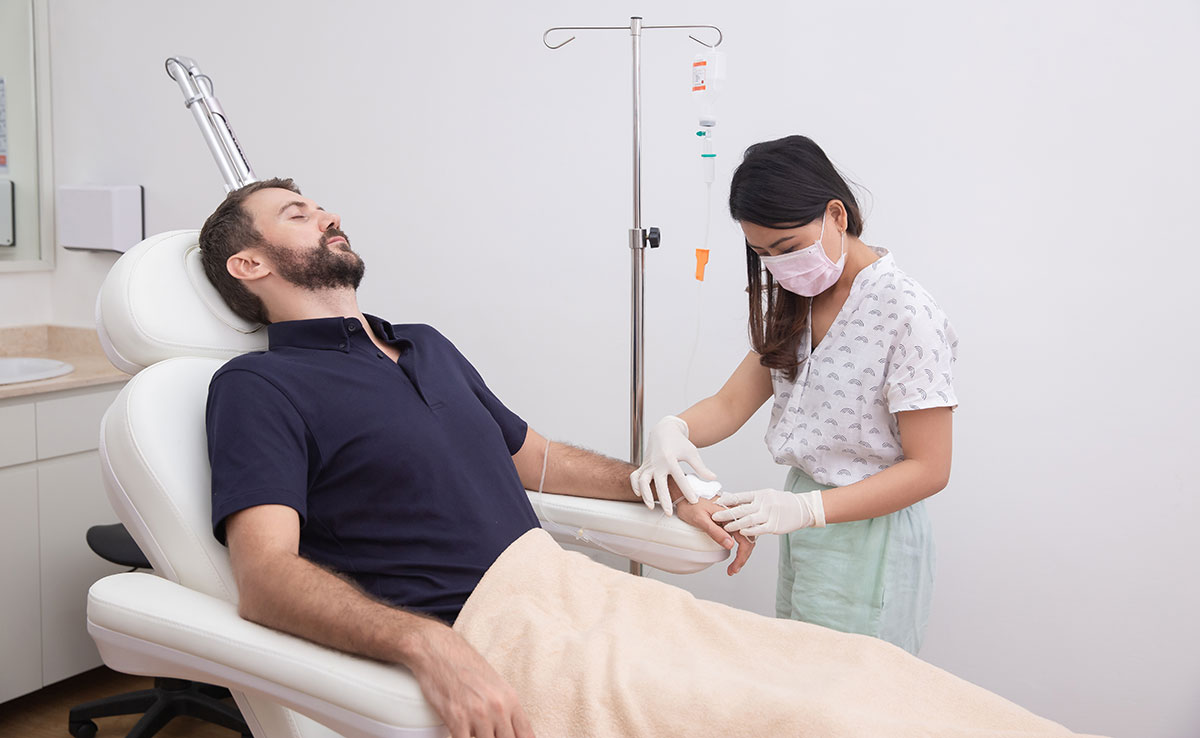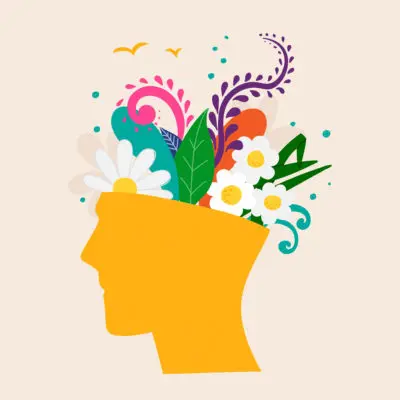Medical Editor: Dr. David Cox, PhD, ABPP
Ketamine is changing the way the world thinks about psychedelic medicine, and off-label infusions may be the most useful method of intake.
Ketamine gained FDA approval in March of 2019, not for infusions, but in the form of the nasal spray Spravato (esketamine), for treatment-resistant depression. With Spravato, the ketamine is absorbed through the membranes in the nose. One nasal spray delivers 28 mg of esketamine.
However, the research suggests that ketamine infusions, administered intravenously one to three times per week are actually the quickest and most effective treatment for depression. So what are ketamine infusions, how do they work, and what else do they treat? Keep reading to learn everything one needs to know about ketamine infusions.
What Are Ketamine Infusions?
Generic ketamine is a mixture of two mirror-image molecules, “R” and “S” ketamine. The FDA-approved nasal spray, Spravato (esketamine), only contains the “S” molecule. Janssen Pharmaceuticals, a subsidiary of Johnson & Johnson, the company behind Spravato, isolated esketamine in order to patent and monetize their product (Spravato costs from $590 to $885 per treatment session). Generic ketamine, or racemic -ketamine, is used in ketamine infusions. While ketamine infusions can be more accessible (and more effective) than the FDA-approved nasal spray, they can also be expensive. Ketamine infusions can cost between $400 to $2,000 per treatment.
Ketamine infusions are also called intravenous ketamine, or ketamine IV. They are administered in a medical clinic or treatment center by a medical professional. Ketamine via infusion is most commonly administered at a dose of 0.5 mg/kg, although a reputable clinic will work closely with patients to find the safest dose with the maximum efficacy. This is considered a subanesthetic dose (compared to ketamine’s role as an anesthetic in hospital and emergency situations).
What Do They Treat?
Ketamine is on the World Health Organization Model List of Essential Medicines, which lists drugs considered to be the most effective and safe while meeting a health system’s most important needs. While ketamine is embraced by psychedelic communities, it is technically a dissociative anesthetic. The substance made a name for itself on the Vietnam battlefield, as it’s a relatively safe anesthetic and maintains hemodynamic stability, or stable blood flow, which is crucial when treating trauma.
Ketamine is still used today in hospitals as an anesthetic. Several studies show that ketamine infusions, administered at subanesthetic doses, can treat depression. In particular, ketamine infusions may be useful to those who have not responded to the first line of depression medications, such as (SSRIs), selective norepinephrine reuptake inhibitors (SNRIs), and tricyclic antidepressants in conjunction with psychotherapy.
Ketamine infusions also can assist in the treatment of post-traumatic stress disorder (PTSD) and combating suicidal ideation. One review found that a single dose of intravenous ketamine rapidly reduced suicidal thoughts (in one day). Ketamine infusions are also being looked into for chronic pain, migraines, OCD, and more.
How Do They Work?
Researchers are still studying exactly how ketamine works. So far evidence suggests that it exerts complex pharmacological actions, including inhibition of biogenic amine uptake, binding to opioid receptors, and inhibition of N-methyl D-aspartate (NMDA) receptors.
One of the benefits of ketamine infusions, in particular for suicidal patients, is that it works quickly. While typical antidepressants such as SSRIs take weeks to build up in the system, a 2019 study suggests that ketamine provides a rapid antidepressant effect with a maximum efficacy reached 24 hours after the infusion by impacting glutamate release in the frontal cortex. Rodent studies suggest that the rise in glutamate triggers and cycling in the medial prefronal cortex (mPFC) leads to the acute activation of AMPA receptors, properties proposed to mediate the rapid antidepressant effects of ketamine.
For patients with depression, one usually goes in for a course of six infusions over two weeks and then comes back as needed for boosters.
What Do They Feel Like?
While ketamine works behind the scenes, rather than directly through the psychedelic experience, the infusion can be a pleasurable one. An infusion typically lasts for about 40 minutes but is adjusted based on the patient’s needs and comfort level. Ketamine infusions should always be done in a safe and reputable clinic under medical supervision.
The patient is typically seated in a comfortable chair or bed. They are sometimes given a mask to wear, or the lights are dimmed. Some clinics provide relaxing music, white noise, or inspirational talks to listen to during the infusions. Others let the patients pick their own, but suggest going with positive, uplifting sounds. Because the IV is given at subanesthetic levels, the patient is conscious but may feel out of their body or in a dream-like state. Closed-eye visuals, dizziness, and euphoria may occur.
Patients are advised to not move about during the infusion. As inhibitions will be lowered, it’s inadvisable to make texts or phone calls during a ketamine session. Some people experience nausea and/or vomiting. When the infusion is over, the patient should be safely escorted home, and relax in a safe environment to avoid accidents.
Are They Safe?
While ketamine infusions are considered generally safe, the long-term effects need more research. One study shows that patients with depression safely used ketamine infusions for up to a year and a half. However, ketamine is also a recreational drug, and could potentially be addictive, even at low doses. When abused, ketamine can cause urinary tract problems.
Because of these risks, ketamine infusions should always be done under the careful care of a trusted doctor. Perhaps the biggest risk is that with ketamine infusion’s rise in popularity, unreliable treatment centers are popping up across the country. Such facilities may make sweeping claims, and take in anyone who can afford it. One should make sure to consult with their doctor and do research before selecting a ketamine treatment center.
Final Thoughts and Conclusions
Most of the research on ketamine treatment is in the form of infusions. While the nasal spray Spravato is the only method of intake with FDA approval, research suggests that conditions such as depression respond best to infusions. Because it’s believed that ketamine impacts glutamate transmission and activates of AMPA receptors, as opposed to serotonin or norepinephrine, it works much faster than SSRIs and other typical treatments for depression, PTSD, and suicidal thoughts.
Ketamine infusions can be time-consuming and costly, so should only be done when necessary, and always under the supervision of a trusted doctor. Because ketamine infusions are done off-label, they are not directly regulated, and not all treatment centers are of the same quality. One should do plenty of research and work directly with a referring physician when selecting a ketamine clinic.







